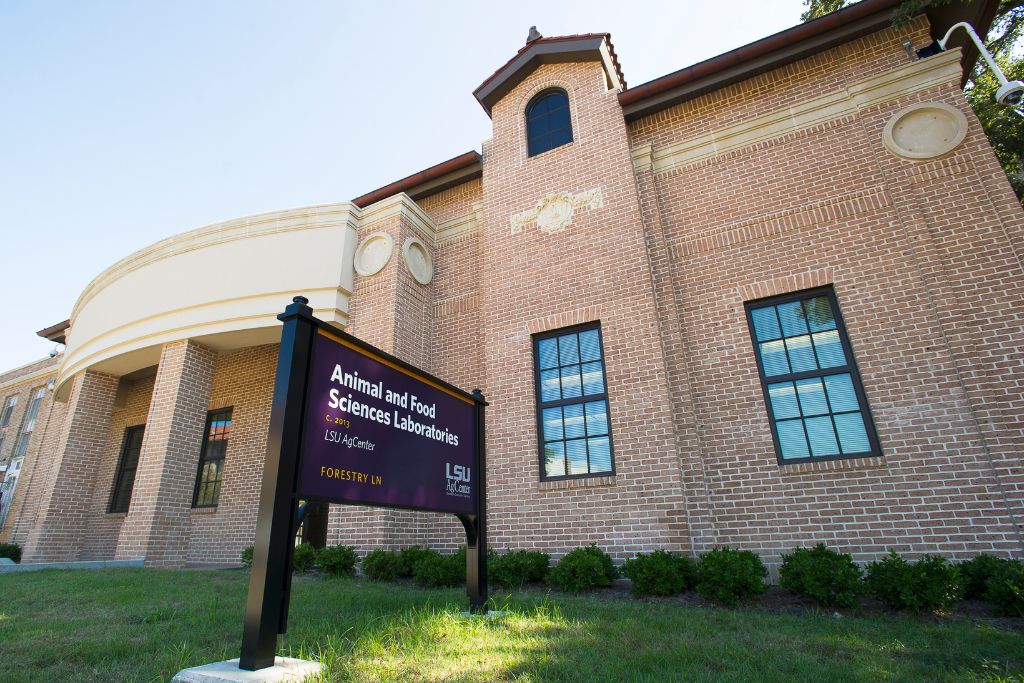School of Nutrition and Food Sciences
The School of Nutrition and Food Sciences aims for excellence with comprehensive, education, scholarship, and outreach. Nutrition professionals provide training in nutrition science, community nutrition, and clinical nutrition with a focus on improving health and well-being of all citizens and populations. Food science professionals train students in the quality, processing, and safety of foods for the multibillion dollar food industry.
Scholarly and educational programs at the undergraduate and graduate level integrate the basic and applied sciences with outreach. In the spirit of the land-grant university system, the School offers students unique opportunities to gain valuable experience by working with our diverse research faculty on projects covering a broad range of nutrition and food science topics.
Our extension faculty, with specializations in consumer/ producer food safety, community nutrition, health and well-being, work with parish agents to deliver science-based information to Louisiana citizens.
The school also collaborates with LSU AgCenter Food Innovation Institute (FOODii) which is a business incubator that specializes in developing emerging food ventures and providing technical services to existing and emerging companies.

Dietetics
Students can pursue a concentration in dietetics to gain specialized skills in human nutrition, food and food system management. Upon successful completion of the program, students can apply for a dietetic internship with the ultimate goal of obtaining professional credentials in dietetics.

Nutrition Sciences with Pre-Med option
The nutrition and food sciences curriculum prepares students for careers in the health professions, specifically dietetics or medicine, or in the food industry. The nutritional sciences/pre-medical concentration provides students with a strong grounding in nutritional sciences while meeting the course work requirements for students planning to apply to most medical or dental schools.

Nutrition, Health, and Society
The concentration of nutrition, health and society prepares students for a variety of careers in nutrition including, but not limited to nutrition education, the food industry, or scientific writing.

Food Science and Technology
For students taking the food science and technology area of concentration, there are several job areas available in the food industry related to food quality and safety, applied microbiology, food engineering, processing and technology, food chemistry and analysis, food business and marketing research, and product development.

Explore Research and Outreach
The School of Nutrition and Food Sciences is integrating basic and applied learning through outreach and extension.


School of Nutrition and Food Sciences in the News
The School of Nutrition and Food Sciences graduate students enrolled in NFS 7022 (Current Topics in Nutrition and Food Science) presented their class project to the faculty at the December 5th department meeting. The students described how they made their healthy snacks, provided samples of the finished product and showcased the websites they created to market their items.
Hydroponics is revolutionizing farming--growing crops in nutrient-rich water instead of soil means saving land and water while boosting growth rates by up to 50% faster than traditional methods. But this innovation comes with a challenge: enclosed systems like greenhouses and vertical farms can quickly spread harmful microbes, threatening food safety. Dr. Achyut Adhikari, Interim Director of LSU's Food Innovation Institute (FOODii), and his team are leading the charge to keep hydroponic produce safe. Their research focuses on preventing pathogens like Listeria monocytogenes--a dangerous bacterium often linked to contaminated produce--without relying on harsh chemicals that harm beneficial microbes. Instead, they're using smart strategies like pH optimization and UV-C light sterilization to stop pathogens while preserving healthy microorganisms. In a recent study published in the Journal of Food Protection, the team found that acidic solutions, UV-C light, and tomato-based nutrient mixes successfully inhibited Listeria growth, offering a practical alternative to chemical treatments. The team is also exploring innovative methods like boiling water decontamination for hydroponic substrates and working closely with farmers to develop science-based protocols that enhance food safety, sustainability, and crop quality. 📄 Read the study: Effect of pH, Nutrient Composition, and UV-C Light Treatment on Listeria monocytogenes in Hydroponic Nutrient Solutions
These references highlight recent research and updates in low-moisture food safety, including outbreak trends, processing technologies, industry needs for research and extension, and pathogen survival kinetics on tree nuts under varying conditions.

